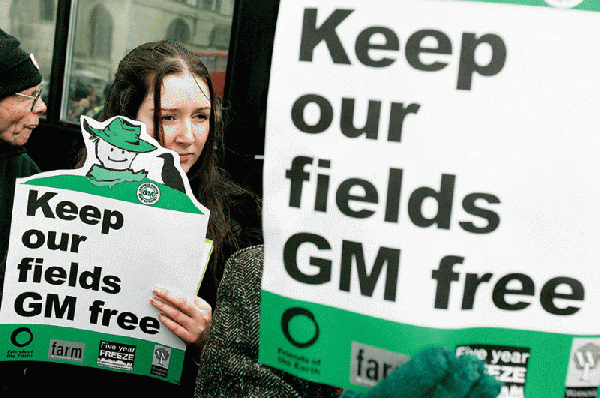
It somehow seems the acme of marketing craziness, fueled by consumer paranoia, that there are now companies paying other companies good money to test and certify that their food products contain no GMOs.
Thus we’re treated to products such as salt, bottled water, and a host of other food/beverage items with labels proclaiming them to be non-GMO, when there’s no way under the sun they could be genetically modified in the first place.
While the anti-GMO groups continue their fear-mongering tactics to keep contributions rolling in, many mainstream media are pointing to the absurdity of the whole thing. Among them is Forbes, a news magazine/website that caters to the business/investment sector, which has had a number of articles and opinion pieces in support of genetically modified crops.

Even though there may be no detectable DNA in highly processed ingredients, “this fact means little to the anti-GMO campaigners (because) there’s money to be made in certification and companies are eager to comply.â€â€”Getty Images/Graeme Robertson
In a recent article, “GMOs: Trust the science, not the food fad,” Robert Wager a Vancouver Island biology professor whose research focuses on genetically engineered crop technology with an emphasis on public education, and Terry Daynard, who farms near Guelph, Ontario, Canada, and is a former executive vice president of the Ontario Corn Producers Association, cite the irony surrounding the issue.
“Other than it somehow involves DNA, surveys how most people have little idea what is a genetically modified organism,” the authors note. But nonetheless, polls say consumers are concerned “about any food containing DNA (virtually all food).”
This has led, they write, to organizations and companies “seeing opportunity in providing profitable lab services” to test for even the minutest amount of GM ingredients. Even though there may be no detectable DNA in highly processed ingredients, “this fact means little to the anti-GMO campaigners (because) there’s money to be made in certification and companies are eager to comply.”
Increasingly, the labels are appearing on food for which there is no GMO equivalent; for example, wheat and oat cereals (“There are no GM oats or wheat grown commercially anywhere in the world”).
But, “There’s money to be made in certification, and companies are eager to comply.” A non-GMO label can cost several thousand dollars per product.
This has had an impact on the price of ingredients; an example they cite is regular avocado oil selling for $1.47 per 100 ml, while non-GMO certified avocado oil is $5.40 per 100 ml in the same store. “There are no GM avocados grown anywhere,” they point out.
There seems little slowdown in the trend of labeling products with non-GMO labels, the authors say, regardless of whether there is a genetically modified counterpart. This continues because, first, “the public does not know what GMO means, and they are regularly exposed to negative stories about them,” and second, “there are food marketers eager to make money on this. By using the public unease, marketers can convince some in the public to look for non-GMO-labeled products.
“The winner in all this is corporate profits. The losers are consumers, who are convinced to pay more for expensive and sometimes nutritionally inferior food products based on unsubstantiated fear generated by anti-GMO marketing campaigns.”
Rather than focusing on identifying GMOs, the authors suggest, “Maybe it’s most important that consumers understand what non-GMO labeling means. For many products, it simply means more profits for the corporation. For us personally, we’re not buying.”
(Read the article at http://bit.ly/2bPwav3)
About the Author(s)
You May Also Like




